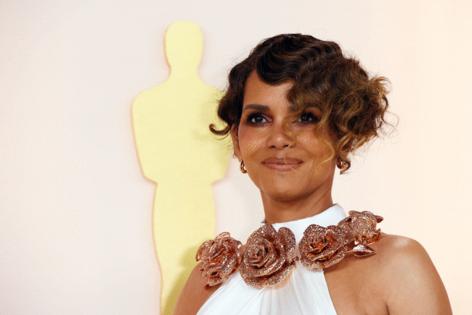Commentary: Menopausal women have a lot at stake in this election
Published in Op Eds
Perhaps you’ve heard: Menopause is having a moment. Celebrities such as Oprah Winfrey and Drew Barrymore have begun speaking out about coping with symptoms and self-worth. Halle Berry shouted from the steps of the Capitol: “I’m in menopause, OK?!”
As menopause advocates, we have long seen this “moment” as overdue, spurring necessary conversations for millions who would otherwise suffer through menopause in silence and shame. It’s a relief to see the topic discussed openly — even if some of the conversations are sparked by odd viral moments on the campaign trail, such as a recent remark by a Republican Senate candidate who thinks it’s“a little crazy” that women past 50 would vote on the issue of reproductive rights.
It’s not at all crazy — and bodily autonomy is not solely about pregnancy and abortion. Menopausal women have a lot at stake on the ballot this year.
Like our younger counterparts, we too must be able to make informed choices about our health. We deserve access to affordable, competent medical care and treatment from trained professionals. We have every right and reason to demand lawmakers and political leaders invest in our well-being, our dignity, our humanity.
Nor are we some niche special interest group. There are legions of us, 75 million strong in the U.S., in some stage of perimenopause, menopause or post menopause.
Here are three issues critical to menopause care that we urge voters to consider.
First, equity in federal funding for medical research. The National Institutes of Health allocates only 10.8% of its $45 billion budget to women’s health, according to the most recent tally (2020), although women make up more than half of the U.S. population. Of that, only a tiny fraction goes to research targeting midlife and menopause — an amount so small it can’t even be computed, given that menopause-specific research is part of a “subcategory of a subcategory,” according to neuroscientist Lisa Mosconi.
In March, President Joe Biden signed an executive order creating a national task force, the White House Women’s Health Research Initiative, with a call for a $12 billion investment in women’s midlife and menopause research. As part of that commitment, just last month the U.S. Department of Defense announced a new $500-million disbursement. Meanwhile, Congress introduced a slate of bipartisan bills this session — the Advancing Menopause and Mid-Life Women’s Health Act in the Senate and three corresponding proposals in the House — all of which would increase funding for research and education about menopause symptoms and treatments. Those are all positive steps, and it is critical that they remain a priority for Congress and the White House. We must pay attention to funding for women’s health research when we go to the polls.
Second, menopause shows up in down-ballot races too. Governors, state legislators, city council members and other officials such as health commissioners and members of boards of regents can reinforce federal commitments via oversight roles — including of publicly funded universities and other entities that produce medical and scientific research. Many of these offices also have the power to increase — or decrease — access to affordable care.
This summer Louisiana passed a historic law mandating insurance coverage of menopause treatments. The California Assembly recently held public hearings about menopause in the workplace; the New Jersey Senate introduced legislation that would establish an interagency council on menopause to undertake research, disseminate evidence-based knowledge and develop state-supported treatment services. Every candidate across the country should be called upon to support initiatives like these.
Third, education is essential. Although half the population in the U.S. will experience menopause, most patients struggle to find a doctor who can help them. Why? According to a Mayo Clinic survey, 20% of U.S.-based medical residents in the fields of obstetrics, family and internal medicine reported having zero menopause training; a mere 7% of those surveyed said they felt adequately prepared to treat menopausal patients. One of the House bills, a bipartisan effort, would create a national public awareness campaign and fund nationwide medical education initiatives. Licensing boards are already catching on: This month, the Federation of State Medical Boards agreed to provide continuing medical education credits for physicians who view a new PBS film on menopause, “The M Factor” (for which one of us was an executive producer).
Other issues at stake in this election, such as access to IVF and hormonal contraceptives — as well as threats to the independence of federal agencies including the National Institutes of Health, the Centers for Disease Control and Prevention and the Food and Drug Administration — can also significantly affect the lives of women nearing or in menopause.
Voters who are menopausal — as well as those who have menopausal family members or may be on the brink of perimenopause themselves, typically women in their 30s and 40s — are a mighty force. Reproductive health is their fight too.
Anthropologist Margaret Mead famously stated: “There is no greater power in the world than the zest of a postmenopausal woman.” Zest is great. So is a robust policy agenda. Women should vote like their lives depend on it, because they do.
____
Jennifer Weiss-Wolf, executive director of the Birnbaum Women’s Leadership Center at New York University School of Law, is the author of the forthcoming “Period. Full Stop. The Politics of Menopause.” Tamsen Fadal, a journalist and co-executive producer of “The M Factor,” is the author of the forthcoming “How to Menopause: Take Charge of Your Health, Reclaim Your Life, and Feel Even Better Than Before.”
©2024 Los Angeles Times. Visit at latimes.com. Distributed by Tribune Content Agency, LLC.




























































Comments